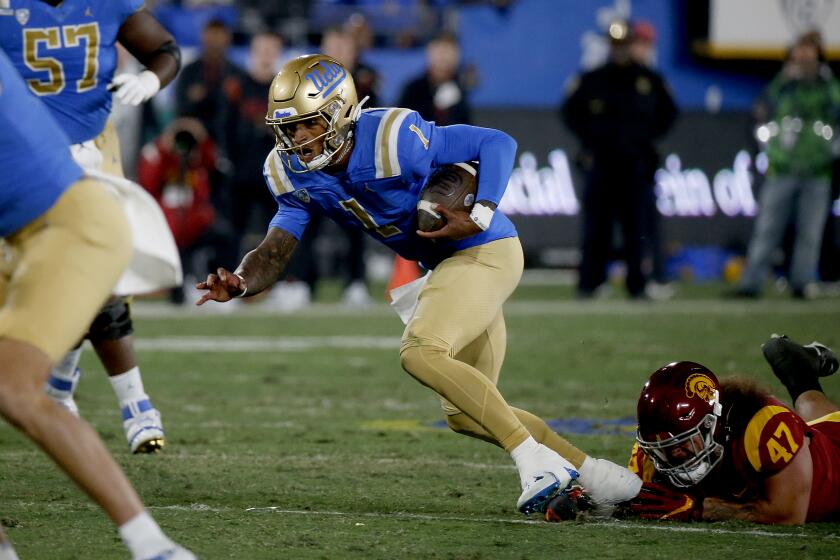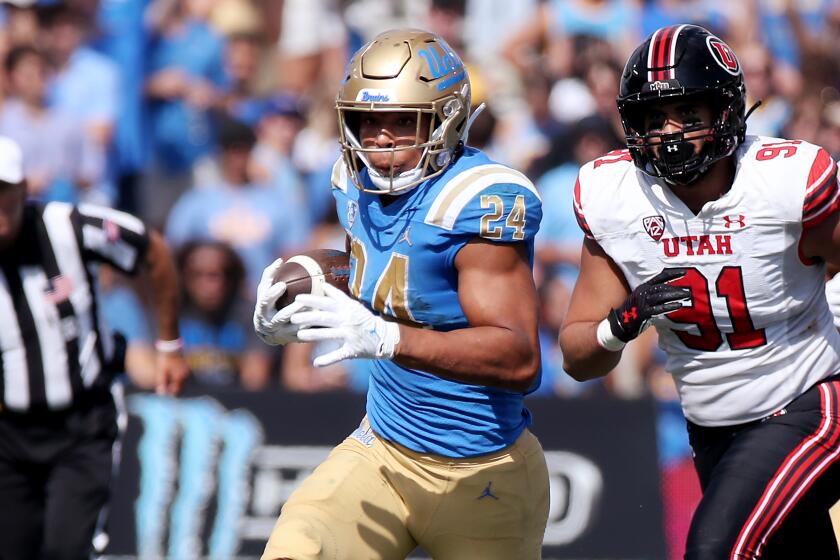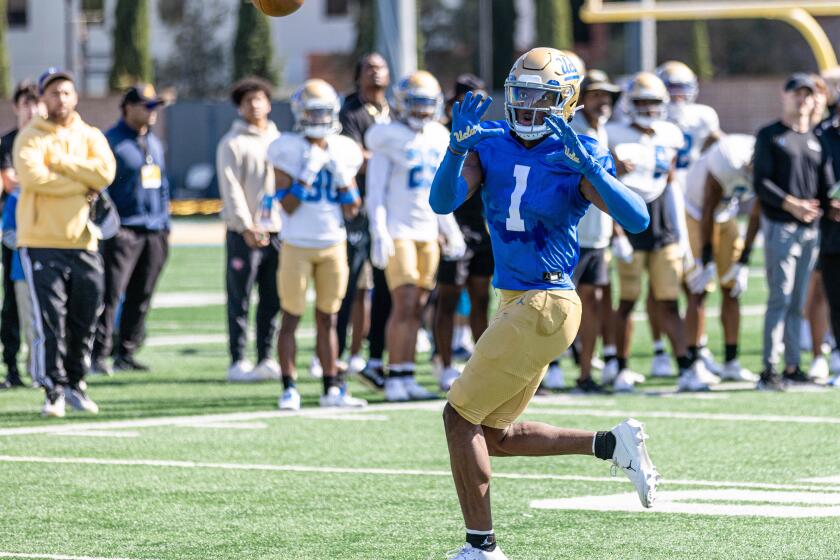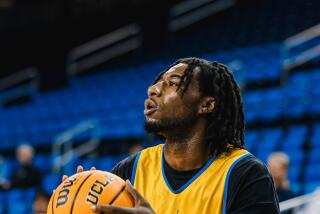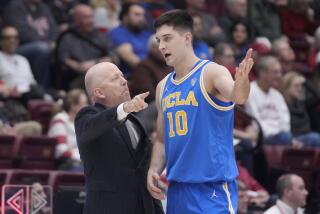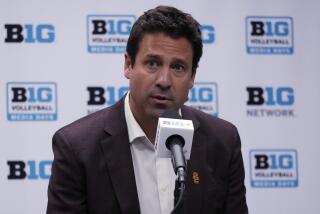Merrick McHenry finds his âhappiestâ place as a dominant middle blocker for UCLA
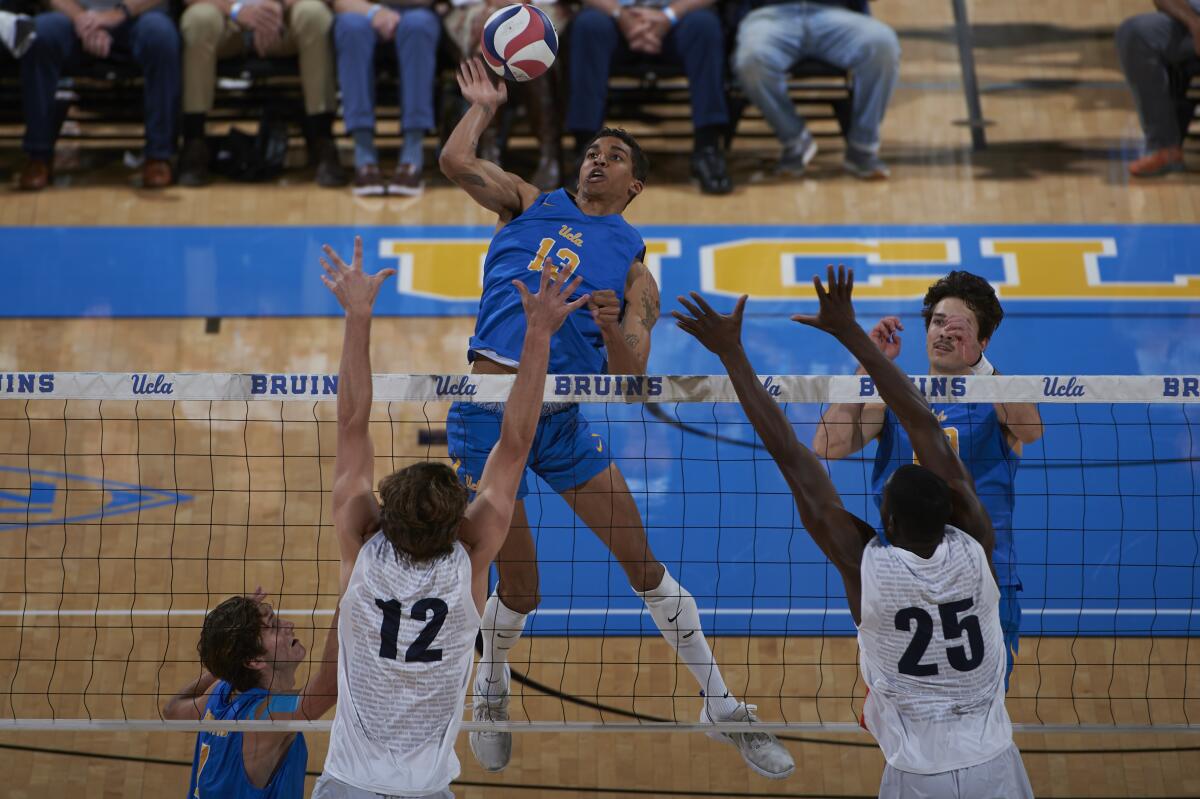
Merrick McHenry didnât think anything of it when he hatched his signature look. He just pulled up his long, white socks, put on his knee pads and went to work on the court. It wasnât until he watched the film later that he realized just how much he liked the knee-high sock look.
It hasnât changed.
âI love being different,â McHenry said with a wide grin. âI just canât help it.â
McHenry is standing out for reasons other than just his wardrobe.
The dynamic middle blocker leads the nation in hitting percentage as No. 1 UCLA sets its sights on its first NCAA title since 2006 this week. The Bruins (29-2) will face Long Beach State at 2 p.m. PDT in Fairfax, Va., on Thursday in the NCAA semifinal after the Beach defeated Grand Canyon in the quarterfinals Tuesday.
UCLA quarterback Dorian Thompson-Robinson is drafted in the fifth round of the NFL draft by the Cleveland Browns. He is the 140th player chosen overall.
UCLA, the winningest program in the sport but mired in its longest championship drought, had its best season in decades. The Bruins won the MPSF tournament for the first time since 2006. They were the first team to go undefeated in conference play since 1996.
For McHenry, getting the chance to compete for championships in college and playing with the U.S. national team like he did last summer seems surreal after growing up in Texasâ small menâs volleyball scene. But those fleeting moments of success arenât enough.
âI really want to be a part of the team that wins the 20th national championship at UCLA,â McHenry said.
The 6-foot-7 redshirt junior still thinks about the way UCLAâs season ended last year. The Bruins had a two-set lead. Long Beach State roared back for a five-set win. Itâs hard to escape the memories when the disappointment happened right in Pauley Pavilion.
With motivation from that loss, the Bruins returned this season with an intense focus. Coach John Speraw marveled at how his team didnât suffer a single emotional letdown this season. He credited some of that to McHenry, whose competitive streak sparks a fire in his teammates.
âHeâs just ultra competitive,â said freshman setter Andrew Rowan, who was named AVCA newcomer of the year while piloting UCLAâs top-ranked offense. âHe gets in these zones in a game where heâs just like, âI donât care, you donât have to set me a ball, but we just have to win.â Heâs all for the team.â
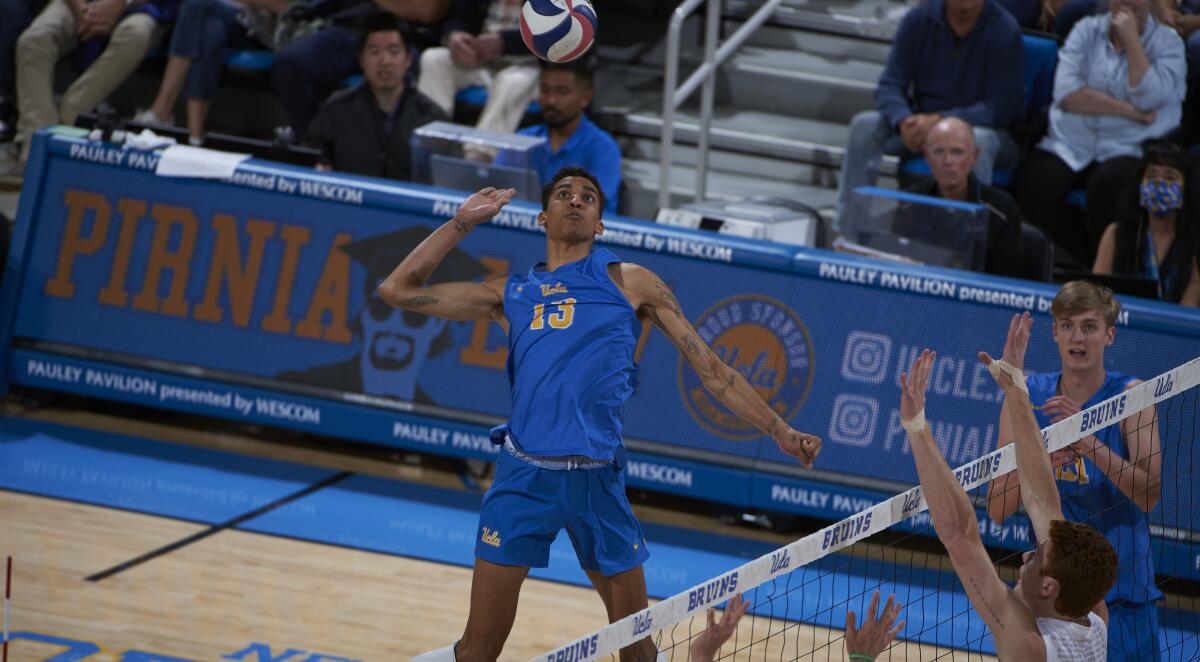
âItâs just me being myself. Iâm not trying to be extra, Iâm not trying to do more. Iâm just ultimately trying to show people that you can be yourself and youâre still going to be loved and appreciated.â
— Merrick McHenry
For the second consecutive year, the Bruins lead the nation in hitting percentage, led by McHenryâs .537 mark that ranks second in UCLA history, trailing only Tim Kellyâs 1994 clip of .539. McHenry earned his second consecutive first-team All-American honor and was named the MPSF tournamentâs most valuable player after he hit a scorching .870 across two matches with 20 kills on 23 attempts and no attacking errors.
Although he came to UCLA as an outside hitter and began training as an opposite, McHenry has found a comfortable home at middle, where he moved in 2021 when the Bruins were short-handed because of pandemic opt-outs and protocols.
Middle attackers often enjoy high hitting percentages after receiving short, quick sets that are hard to defend. Offensively, McHenry had no problem making the transition as he ranked third in the conference in hitting percentage in 2021.
The bigger learning curve was on defense, where he was responsible for organizing UCLAâs block and defending the net on almost every point instead of just contesting one side of the net. He watches the game differently now, keeping a close eye on the setterâs hands, and focuses on fine details of the blocking technique like hand placement.
McHenryâs 107 total blocks this season are a career high and he ranks eighth in the country in blocks per set at 1.081.
Zach Charbonnet, who powered UCLAâs running game the last two seasons, was chosen by the Seattle Seahawks in the second round of the NFL draft Friday.
âHe understands he can be a really elite-level volleyball player,â Speraw said. âHe knows itâs going to take a lot of strength, a lot of personal development, and a lot of technical improvements and I think he takes all of those things incredibly seriously.â
Speraw, the U.S. menâs national team coach since 2013, was the main reason why McHenry wanted to attend UCLA to mold his professional and national team aspirations. Volleyball has been McHenryâs love since he first followed his mother, a former middle blocker at Texas Tech, to her practices when she started coaching.
Many of McHenryâs peers outgrew the small boysâ volleyball community in Texas and moved to St. Louis or California for more abundant club opportunities. It was rare that top volleyball prospects came from Texas and McHenry is proud to represent the state. Even his signature socks are inspired by Texas womenâs volleyball.
But not all of his memories about the state are positive. Coming to UCLA helped McHenry embrace his identity.
â[To] be a gay man and grow up in Texas ⌠I just felt out of place,â McHenry said. âTo be able to be around people who still love me despite what a lot of parts of the world might see as different ⌠itâs a journey and it still is a journey but I think Iâm the happiest Iâve ever been in my own skin as a 22-year-old nowadays. I think itâs only just going to get better for me.â
J. Michael Sturdivant (Cal) and Kyle Ford (USC) played against UCLA last year, so when they decided to transfer, the Bruins were already sold on them.
McHenry never felt like he had role models who looked like him in menâs volleyball. Watching BYU All-American Ben Patch, who like McHenry is Black, was a defining moment. The star opposite soared through the air with his signature bleached-blond hair and helped the Cougars to the NCAA championship game twice before a successful pro career in Europe and with the U.S. national team. McHenry hoped that one day people would look at him and see themselves the way he felt when he watched Patch.
This season, after a match at George Mason, a fan approached McHenry. He thanked the UCLA star âfor all that youâve done for usâ in the LGBTQ+ community. The memory brings a humble smile to McHenryâs face.
âItâs just me being myself. Iâm not trying to be extra, Iâm not trying to do more,â McHenry said. âIâm just ultimately trying to show people that you can be yourself and youâre still going to be loved and appreciated.â
Rowan, the setter, said UCLAâs unique personalities are the key to the teamâs success. The Bruins are âjust going to be ourselves and weâre going to come out and weâre going to beat you,â he said. They have socks of all lengths, ranging from J.R. Norris IVâs that barely peek out over his shoes to McHenryâs that stretch up to his knees.
As a star on a team with national appeal, McHenry is hopeful for the day when more young players are wearing their socks pulled up high too.
More to Read
Go beyond the scoreboard
Get the latest on L.A.'s teams in the daily Sports Report newsletter.
You may occasionally receive promotional content from the Los Angeles Times.

